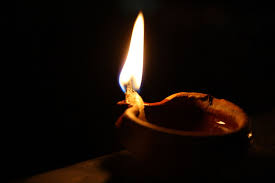By GARY ALLEY
December 2015
Yet, there will be no gloom for the land which was anxious.
In earlier times he humiliated the land of Zebulun, and the land of Naphtali;
but in the end he honors the way of the sea, the region beyond the Jordan,
and the Galilee of the nations.
The people walking in darkness have seen a great light.
A light shines on those living in the land of the shadow of death. (Isa 9:1-2)
 Over 2700 years ago, the Prophet Isaiah recorded a time when an oppressive darkness swallowed his land. At that time, the Assyrian king, Tiglath-Pileser III, had conquered the northern tribes of Israel and taken many into exile. Judah and its capital, Jerusalem, had survived after making a preemptive treaty with Assyria. Yet, those Judean survivors could only fearfully gaze north upon their Israelite brothers’ ravaged land as a reminder of their own tenuous position.
Over 2700 years ago, the Prophet Isaiah recorded a time when an oppressive darkness swallowed his land. At that time, the Assyrian king, Tiglath-Pileser III, had conquered the northern tribes of Israel and taken many into exile. Judah and its capital, Jerusalem, had survived after making a preemptive treaty with Assyria. Yet, those Judean survivors could only fearfully gaze north upon their Israelite brothers’ ravaged land as a reminder of their own tenuous position.
When one looks out over the land, he sees distress and darkness, gloom and anxiety,
shadows and people forced from the land. (Isa 8:22)
According to tradition, these ten “lost tribes” of Israel would disappear within the pages of history, assumed to have been assimilated by the surrounding nations. It would be 150 years later till Jerusalem and its temple would be destroyed by another enemy, the Babylonians. Isaiah again describes it:
Like a frightened gazelle or a sheep with no shepherd,
each will turn toward home, each will run to his homeland.
Everyone who is caught will be stabbed;
everyone who is seized will die by the sword.
Their children will be smashed to pieces before their very eyes;
their houses will be looted and their wives raped. (Isa 13:14-16)
The Babylonian king, Nebuchadnezzar, would also force many from Judah down the long path of exile, like their Israelite brothers, as refugees. 70 years later after the Babylonian exile, with the return of a small group of refugees, Jerusalem and its temple were rebuilt, though not to its former scale or grandeur.
Many years later, another foreign army would again attack Jerusalem, this time by Antiochus IV, the Seleucid king, who is remembered particularly for desecrating the temple (167 BCE).
Raging like a wild animal, [Antiochus] set out from Egypt and took Jerusalem by storm. He ordered his soldiers to cut down without mercy those whom they met and to slay those who took refuge in their houses. There was a massacre of young and old, a killing of women and children, a slaughter of virgins and infants. In the space of three days, eighty thousand were lost, forty thousand meeting a violent death, and the same number being sold into slavery. (2 Mac 5:11–14)
The Jewish festival of lights, Hanukkah, celebrates Judah the Maccabee’s successful rebellion and restoration of the temple three years later. Despite Judah’s legendary victory, four years later he would fall in battle. It would take another twenty years to remove all Seleucid presence from Jerusalem.
Generations later another foreign king under the auspices of the Roman Empire would once again devastate the environs of Jerusalem by slaughtering all the male children under two years of age in Bethlehem, a local village. Wise men from the East had come to Jerusalem bearing gifts—gold, frankincense, and myrrh—for a new toddler king. Herod the Great, King of the Jews, but not a Jew himself, responded to this apparent challenger to his puppet throne with extreme cruelty.
When Herod saw that he had been tricked by the wise men, he became enraged.
He sent men to kill all the children in Bethlehem and throughout the surrounding region from the age of two and under, according to the time he had learned from the wise men.
Then what was spoken by Jeremiah the prophet was fulfilled:
“A voice was heard in Ramah, weeping and loud wailing,
Rachel weeping for her children, and she did not want to be comforted,
because they were gone.” (Mt 2:15-18)
Prior to Herod’s bloodshed, the child Jesus and his parents had fled to Egypt after being warned in a dream. The other parents of the slaughtered infants and toddlers were not so fortunate. Jesus and his parents would remain in Egypt as political refugees until the death of Herod.
Today, when we look out over the world, we see that clouds have darkened our landscape. Recurring news of violent attacks against innocents is no longer the exception but the rule. Some areas of the world feel as if they are under a suffocating shadow of death. At this time of year, during Christmas and Hanukkah, it is easy for Christians to proclaim that “Jesus is the light of the world” and wash our hands from global or even communal responsibility for those suffering. It is much harder to declare Jesus’ words—“You are the light of the world…let your light shine before people, so that they can see your good deeds and give honor to your Father in heaven."
History may be cyclical; violence and suffering may be inevitable, but as disciples of Jesus we are commanded to be light in this darkness. Our actions may be diverse in how each one of us shines the light, but our results will always be the same. If we truly shine a light in the darkness, those around us will come to the light and God will be praised.
![]()
